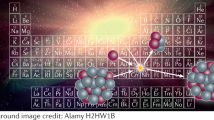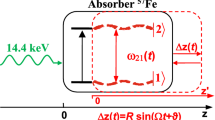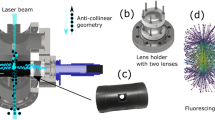Abstract
PASCHEN (Ann. d. Phy. 71, p. 152, 1923), in his investigation of the spectrum of doubly ionised aluminum (Al. III.), and Fowler (“Series in Line Spectra,” p. 120), in his study of ionised magnesium (Mg. II.), have pointed out the type of series relations which exist in these substances, and have arranged many lines to conform to them. In a study 01 the spectra of both aluminum and magnesium in the extreme ultra-violet, under various forms of excitation, I have recently observed certain lines which appear to be higher members of some of the series discovered by Paschen and by Fowler ; Millikan has already identified the two strongest, but the remainder seem to have escaped observation. The wave-lengths and the series to which these lines belong are given in the following tables.
This is a preview of subscription content, access via your institution
Access options
Subscribe to this journal
Receive 51 print issues and online access
$199.00 per year
only $3.90 per issue
Buy this article
- Purchase on Springer Link
- Instant access to full article PDF
Prices may be subject to local taxes which are calculated during checkout
Similar content being viewed by others
Author information
Authors and Affiliations
Rights and permissions
About this article
Cite this article
LYMAN, T. Series in the Spectra of Aluminum and Magnesium in the Extreme Ultra-Violet. Nature 114, 641–642 (1924). https://doi.org/10.1038/114641b0
Issue Date:
DOI: https://doi.org/10.1038/114641b0
Comments
By submitting a comment you agree to abide by our Terms and Community Guidelines. If you find something abusive or that does not comply with our terms or guidelines please flag it as inappropriate.



